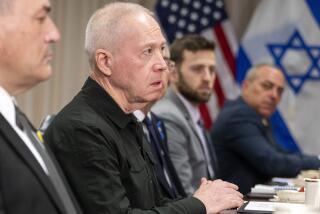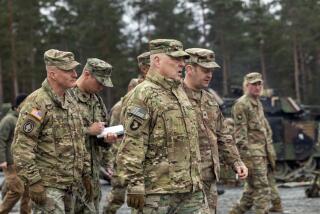Bush OKs Bigger U.N. Military Role : Gulf crisis: A meeting of the Security Council’s defense arm is planned. It would coordinate anti-Iraq moves and accommodate the Soviets.
- Share via
WASHINGTON — Despite strong opposition to putting U.S. troops under foreign commanders, the Bush Administration has agreed to a high-level meeting of the military arm of the U.N. Security Council in a step that will broaden the U.N. umbrella for any military action against Iraq, Administration and diplomatic sources said Tuesday.
An Administration official confirmed that representatives of the five permanent members of the Security Council are planning to meet soon at “a three-star level, a lieutenant-general level,” giving the long-moribund U.N. Military Staff Committee greater authority than it has had for the last four decades.
The move to upgrade the U.N. military arm is intended to help overcome the many problems of coordination that have arisen as multinational forces have gathered in the Persian Gulf. The problems prompted a visit to Saudi Arabia this week by Gen. Colin L. Powell, chairman of the Joint Chiefs of Staff.
The move also is aimed at accommodating the Soviet Union, which began pressing even before the gulf crisis to have the U.N. Military Staff Committee given new power. Last month, Soviet Foreign Minister Eduard A. Shevardnadze proposed that the United Nations set up a rapid-response force made up of military units from several countries to handle future emergencies like Iraq’s invasion of Kuwait.
“The Pentagon is concerned about any subordination of U.S. forces to anyone else or about putting U.S. forces in a position where the chain of command is a complicated one and you can’t make decisions easily,” one U.S. official said this week. “But there is an understanding on the Pentagon’s part, as well, that we’ve got multinational forces there (in the Persian Gulf), and there’s a need for a certain umbrella for them.”
U.S. officials emphasized that the bolstering of the Military Staff Committee will not amount to setting up a formal U.N. military command. Rather, it will be “a vehicle for coordination,” one source said.
A European diplomat suggested that the Military Staff Committee could provide a vehicle that would ease the concerns of countries such as France about having their troops in Saudi Arabia put under American direction.
“It’s for sure that the Americans will play the most important role” in the U.N. effort at military coordination, this diplomat said Tuesday. “But we can’t say that. We have to find a way to explain things that will not look like a new American hegemonism in the world. You know the French sensitivities about having French troops under U.S. command. There has to be a solution that is acceptable to the French public.”
The U.N. Military Staff Committee is made up of military officers from the United States, the Soviet Union, Britain, France and China.
Under the U.N. Charter, the committee was supposed to direct any military forces established by the Security Council. But during the Cold War years, the Security Council was too divided to agree on any tasks for its military arm, which conducted only brief meetings involving low-level officers such as majors or colonels.
In 1987, Soviet President Mikhail S. Gorbachev suggested that the Military Staff Committee be empowered to take on new tasks such as directing U.N. peacekeeping forces. During the early weeks of the gulf crisis, in a gesture to the Soviet Union, the committee was given a slightly expanded role when its senior officers were allowed to meet three times, but only in the presence of their ambassadors.
Since then, Soviet officials have kept pressing to give the U.N. military arm a larger role. “We must put life into the Military Staff Committee,” Soviet Foreign Ministry spokesman Gennady I. Gerasimov said last month. Two weeks ago, Soviet Deputy Foreign Minister Vladimir F. Petrovsky proposed that the committee convene at the level of the military chiefs of staff.
“The results of this effort to rely on the Military Staff Committee could be very important, not only for the Iraq crisis but for the next 20 years,” the European diplomat said. “This is very important for the future, for other regional conflicts.”
American commanders in Saudi Arabia remain deeply concerned about an unorthodox chain of command that, in case of war, would leave the United States with no direct control over most of the two dozen armies in the area. Those forces instead would report directly to a Saudi regional commander.
On Tuesday, in a meeting with Prince Sultan ibn Abdulaziz, the Saudi defense chief, Powell was understood to have sought more streamlined arrangements that would give the United States clear authority over the forces operating in support of U.S. military operations.
Speaking with reporters in Riyadh before the meeting, his first with Saudi officials since the crisis began, Powell said he expected to discuss “the status of our buildup” and to make “a general review of all of our plans.”
Gen. H. Norman Schwarzkopf, U.S. commander in the region, and his Saudi counterpart, Prince Khalid ibn Sultan ibn Abdulaziz, are effectively equals, with major decisions theoretically made in tandem. British forces report directly to the United States while those of every other nation except France answer to the Saudis.
With Muslim units positioned on the front lines immediately ahead of the heavier U.S. forces, the lack of coordination has caused concern among American commanders about possible mix-ups in case of combat. As a result, the United States has sought to conduct joint exercises with forces in adjoining positions.
But progress has been slow. After announcing the first U.S.-Saudi ground-force training operation last Thursday, American military officials abruptly canceled a trip for members of the press to follow-up exercises over the weekend, initially saying that the exercises had been postponed.
A military spokesman offered a new explanation Tuesday night, saying that the operation, which involved units firing 81-millimeter mortars, had gone so well that neither the United States nor Saudi Arabia saw any reason to repeat it. There is no indication, however, that other units have yet begun similar joint training.
Tensions also linger between the Americans and Saudis, on the one hand, and the French, on the other, over Gallic insistence that French forces answer to no one but Paris.
Under pressure from the Saudi government, French Foreign Legionnaires who had arrayed themselves close to the Iraqi border near the town of Hafir al Batin began Tuesday to withdraw to positions behind Syrian and Egyptian forces, according to Western diplomats.
The “tactical realignment” came after the Saudi government expressed pique over the unauthorized presence of non-Muslim forces along the front lines, the diplomats said.
Gen. Maurice Schmitt, chief of staff of the French armed forces, met with top American commanders in Washington on Sunday in an effort to sort out some of the differences and will host Powell on a visit to Paris later this week.
Powell, who is making his first trip to Saudi Arabia since Sept. 9, spent more than eight hours meeting with Schwarzkopf and his senior staff Monday night and Tuesday, reviewing what the chairman of the joint chiefs described as “a very complex military buildup.”
“You sit and go over all the details of our dispositions here, our defensive plans here, and obviously we examined every possible contingency with which we might be faced,” Powell told a small pool of reporters.
Mann reported from Washington and Jehl from Saudi Arabia.
More to Read
Sign up for Essential California
The most important California stories and recommendations in your inbox every morning.
You may occasionally receive promotional content from the Los Angeles Times.













